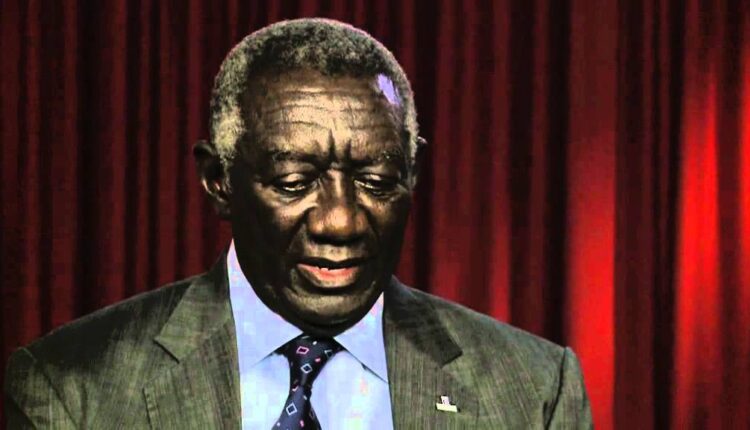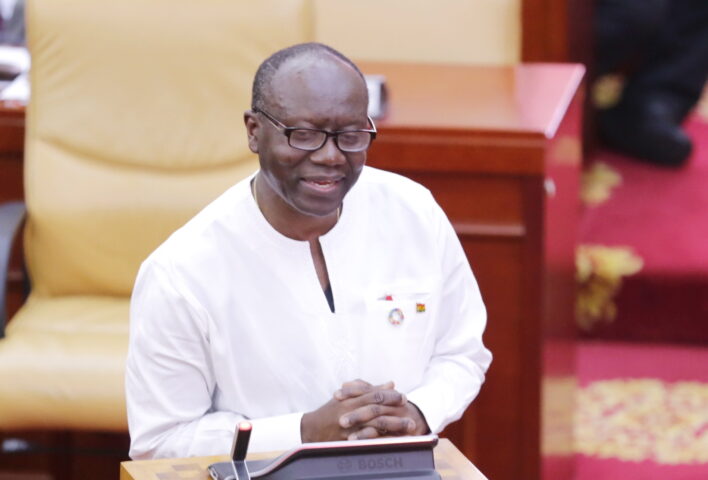‘Reject leaders who take us back to Egypt’ –Ken Ofori-Atta campaigns at budget reading
Finance Minister, Ken Ofori-Atta, has prefaced his budget reading with a passionate call on Ghanaians to reject the opposition National Democratic Congress at the 2020 general elections.
He compared voting for the country’s largest opposition, NDC, to the Biblical admonition to the Israelites not to return to Egypt, a land where they were enslaved for more than a century.
“Reject leaders who take us back to Egypt,” he told an unusually quiet parliament on Wednesday.
The Finance Minister ran the MPs through a brief comparative history of Ghana’s economy and pointed out that it had always taken an NPP administration to rescue the economy from poor management under the NDC.
He pointed to the Kufuor administration that was able to obtain debt forgiveness from the International Monetary Fund (IMF) after the NDC government saw Ghana’s external debt remained unsustainable levels by the year 2000.
That IMF programme was the controversial Heavily Indebted Poor Countries (HIPC) Initiative that came in 2001 with austerity measures.
Countries that qualified for HIPC assistance were those with a per capita GDP of less than $700. Ghana as of 2001 had a per capita GDP of about US$300.
The programme was completed by 2004 under John Agyekum Kufuor-led NPP administration.

According to one of Ghana’s lenders, African Development Bank (AfDB), the HIPC completion provided Ghana with an irrevocable debt relief of US$ 131 million in net present value (NPV) terms.
Ghana was also released from up to 80% of annual debt service to the Bank Group until January 2013. In practical terms, its 2004 debt service obligations, for example, fell from about US$ 25.15 million to about US$ 5.03 million.
Ken Ofori-Atta said the NDC eroded those economic gains after it won power in 2009. He chided the Mahama administration for returning Ghana to the IMF for the second time in 15 years.
Ghana turned to the Washington-based lender in April 2015 after lower prices for its gold, cocoa, and oil exports caused debt to balloon and the currency to decline against the dollar while regular power cuts weighed on the economy.
Then-president, John Mahama sought a three-year IMF programme to bring in some $1 billion to stabilise an economy, dogged by high deficits, inflation, and public debt.
The Finance minister, Ken Ofori-Atta, said it once again took an NPP administration to complete this IMF program in record time after the three-year programme was poorly implemented under NDC hands.
Rallying Ghanaians to reject the NDC at the polls, Ken Ofori-Atta said, “a leader who cannot run the economy is a leader who must never be trusted to deliver.”

Laying down his criteria for choosing political leaders, the minister said “leadership is about the economy and character of the leader.”
Ken Ofori-Atta said Ghanaians should look for a leader who understood the economy and had the conviction to take bold decisions and the courage to follow through those decisions.
He said these qualities were crystallised in the Akufo-Addo government.
In comparison, he said after inheriting an inflation rate of 15.4% from the Mahama administration, the Akufo-Addo government had seen that index drop to 7.9% by December 2019, the lowest since 1992.
He said the average fiscal balance (the government’s income and expenditure)used to be less than 5% of GDP under the previous government but was now 6.8% under the NPP.
The Finance minister recalled that under Mahama, Ghana’s currency was once the worst-performing in the world, according to a 2014 Bloomberg report.
He also accused the Mahama administration which was in charge of the economy between 2013 and 2017 of being responsible for shrinking the economy by some $10bn by the time it left office.
Talks of Ghana heading into another IMF programme has been stoked by some in the NDC, pointing to Ghana’s debts which have reached a dangerous level, according to the IMF.
The IMF has said it expects Ghana to end 2020 with a worrying 76.7% debt-to-GDP ratio.
The figure puts the country at a high risk of debt distress country category.
In 2016 when the NDC lost power, the ratio was 44%. But under the NPP government, it has risen to 58.3% in 2017, rising again to 59.1% in 2018.
In 2019, the nation’s debt stood at 62.8% of GDP.
But the government has said the country is not heading back to the IMF.
At the budget reading, the Finance Minister was emphatic that “HIPC is behind us.”
“There is no turning back,” he said and added that the NDC has been ‘wishing Ghana ill’ even though it is responsible for mismanaging the economy.



